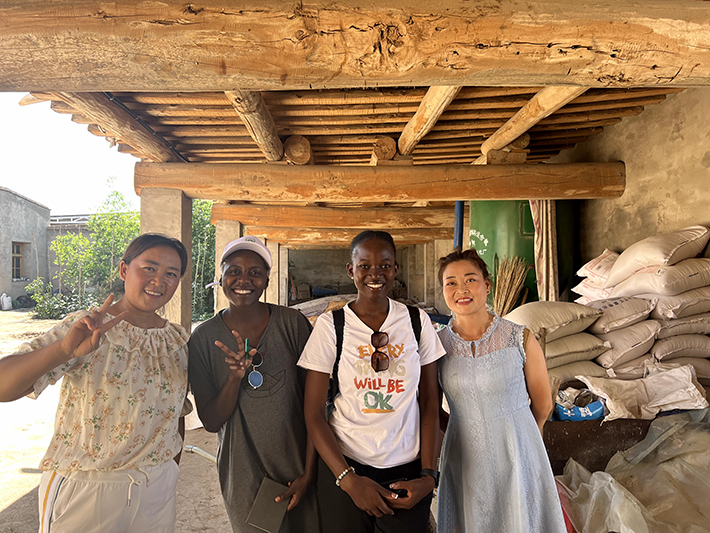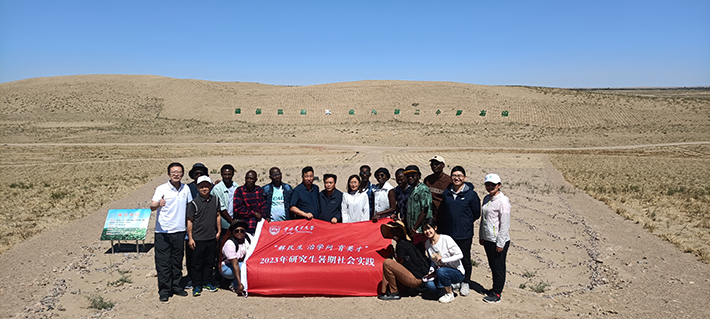|
||||||||||
| Home Nation World Business Opinion Lifestyle ChinAfrica Multimedia Columnists Documents Special Reports |
|
||||||||||
| Home Nation World Business Opinion Lifestyle ChinAfrica Multimedia Columnists Documents Special Reports |
| ChinAfrica |
| The Art of Coexistence |
| An African view of the endeavour to balance the allocation of water for agriculture, ecology and economy in China |
| By Andam Andin Ndi Buma | VOL. 15 September 2023 ·2023-10-03 |

Andam Andin (second right) with farmers in Gansu Province, China, on 22 July (COURTESY)
A tale of harmony unfolds in the enchanting deserts of northwest China’s Gansu Province where water, agriculture, ecology, society and economy dance in a delicate balance. Despite generations of water scarcity, this arid land has learnt how to use its resources rationally, and the desert dwellers have found an equilibrium between human needs and nature’s preservation.
Gansu’s historical significance intertwines with the ancient Silk Road, connecting China with Central Asia, the Middle East, and Europe. Positioned strategically between China’s eastern and western parts, the province plays a pivotal role in development. While challenges like water scarcity and desertification affect the Shiyang River basin, Gansu’s historical allure, and commitment to environmental concerns accentuate its contemporary importance in northwest China.
I studied the water-saving irrigation technologies applied to combat drought’s impact in this kind of landscape. While looking at the desertification prevention initiatives, I found inspiration from communities striving for ecological preservation and economic growth. Collaborative efforts among policymakers, governing bodies, and communities strike a harmonious balance between nature and humans. My Gansu experience illuminated a shared vision of prosperity, environmental harmony, and socio-economic advancement.

Andam Andin (third left) communicates with farmers in Gansu Province, China, in July (COURTESY)
Collaborative endeavour
In an effort to foster agricultural collaboration between China and African countries, I embarked on a field trip to learn how people have overcome the pressing challenges of drought and desertification in the Shiyang River basin. This endeavour aligns with Chinese President Xi Jinping’s vision on building a high-level China-Africa community with a shared future, inspiring hope for a brighter and more sustainable tomorrow.
During my field trip to the Shiyang River basin in Gansu Province, I had an enriching experience filled with diverse interactions. Engaging with the local communities, researchers, and extension agents provided valuable insights into the region’s water management challenges and the efforts being made to combat drought and desertification.
I witnessed the local villagers’ resilience in the face of water scarcity. Villagers showcased their commitment to sustainability through a creative rainwater harvesting system, strategically designed with small check dams and contour trenches to get water for home use and irrigation. This demonstrated their strong sense of community engagement to safeguarding the environment and their livelihoods. The villagers’ resourcefulness in finding local solutions to water challenges and their dedication to maximise water utilisation left a lasting impression.
During my interactions with researchers at the Shiyanghe Experimental Station, I was fascinated by their experiments on water-saving irrigation technologies, each holding the promise of transforming agriculture while conserving precious water resources. They showcased a state-of-the-art drip irrigation system that efficiently delivered water directly to plant roots, reducing water wastage significantly. Additionally, I learnt about their cutting-edge use of soil moisture sensors and weather forecasting systems, enabling precise irrigation scheduling tailored to the crops’ needs and weather conditions. Their dedication to promoting such innovative solutions left a deep impression on me, as these advancements could lead to a more sustainable and prosperous future for the region’s farmers and ecosystems.
Meeting with extension agents highlighted their crucial role in bridging scientific research and practical water management implementation. Through informative workshops and hands-on training, they enabled local farmers to adopt water-efficient practices, like drip irrigation and rainwater harvesting. Field demonstrations showed the effectiveness of these techniques, fostering knowledge exchange and making research findings relevant to farmers’ needs. Their work has facilitated widespread adoption of sustainable practices, positively impacting agricultural productivity and environmental conservation.
Being on the site allowed me to make direct and accurate assessments of the water resources, infrastructure, and practices in place. It also provided me with a deeper contextual understanding of the local environment, climate, and socio-economic factors that influence water availability and usage. The opportunity to engage with local communities enriched my experience. Overall, firsthand observations on the field played a pivotal role in bridging the gap between theory and practice.
In Gansu, government policies play a critical role in shaping water management strategies. Recognising water scarcity challenges, policymakers encourage conservation and sustainable practices through subsidies for water-saving irrigation technologies and rainwater storage methods. Asia’s biggest desert reservoir, Hongyashan Reservoir, exemplifies the government’s commitment to enhancing water availability in the arid desert region. Additionally, targeted subsidies incentivise efficient water use in different sectors, striking a balance between supply and demand. This holistic approach reflects the government’s dedication to safeguarding the environment, supporting livelihoods, and securing a sustainable water future for Gansu.

A research team from China Agricultural University pose for a group photo at the Laohukou Desertification Prevention and Demonstration Area in Gansu Province on 21 July (COURTESY)
Valuable lessons
As for the significance of policymaking, I have realised how effective policies can enhance water security and protect livelihoods. The participatory approach I witnessed empowers communities, fostering a sense of ownership and responsibility. Equitable distribution of resources allows for sustainable development, benefitting both present and future generations. The region’s efforts in aligning policy governance with ecological and socio-economic goals, are commendable, paving the way towards a more balanced and resilient water future.
My experience in Gansu helped me to understand the significance of policymaking in achieving water harmony. I commend the participatory approach empowering communities, leading to a more balanced and resilient water future. Valuable lessons I gained include the importance of effective policies in enhancing water security and protecting livelihoods. Balancing water use for agriculture, ecology, and human consumption through equitable resource distribution fosters sustainable development. These lessons have relevance for arid regions facing similar challenges worldwide, offering insights into collaborative strategies for addressing water scarcity, fostering environmental preservation, and promoting socio-economic wellbeing.
My experiences in the Shiyang River Basin reaffirmed the significance of collaborative efforts in combating water challenges, involving local communities, researchers, and extension agents. Effective ecological restoration relies on solution-based approaches, and collaboration between scientists, policymakers, and stakeholders for a sustainable future. Gansu Province’s key takeaways in water management encompass effective policies, participatory decision-making, and equitable resource distribution for ecological and socio-economic goals. Cross-cultural exchanges play a vital role in addressing complex issues, fostering collaboration, and sharing innovative solutions for a sustainable and harmonious future that benefits all.
The author is a student at China Agricultural University.
|
||||||||||||
| About Us | Contact Us | Advertise with Us | Subscribe |
| Copyright Beijing Review All rights reserved 京ICP备08005356号-5 京公网安备110102005860号 |